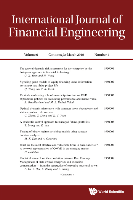
International Journal of Financial Engineering
Scope & Guideline
Innovating solutions for complex financial challenges.
Introduction
Aims and Scopes
- Financial Risk Modeling and Management:
Research in this area includes the development and application of models for assessing and managing financial risks, including credit risk, market risk, and operational risk, utilizing quantitative methods and statistical techniques. - Quantitative Finance and Algorithmic Trading:
This scope focuses on the use of quantitative methods, machine learning, and algorithmic strategies in trading and investment, including the development of predictive models and trading algorithms. - Behavioral Finance and Market Dynamics:
Exploration of how psychological factors impact financial decision-making and market behaviors, including sentiment analysis and the effects of social media on financial markets. - Corporate Finance and Governance:
Research addressing corporate financial strategies, capital structure, governance issues, and the impact of regulation on firm performance and risk management. - Sustainable Finance and Environmental Economics:
Examination of the intersection between finance and sustainability, including green finance, ESG (Environmental, Social, Governance) considerations, and the financial implications of climate change. - Fintech Innovations and Financial Technologies:
Investigation into the latest financial technologies, including blockchain, cryptocurrencies, digital banking, and their implications for traditional financial systems.
Trending and Emerging
- Machine Learning and Artificial Intelligence in Finance:
There is a significant increase in research utilizing machine learning and AI techniques for predictive modeling, risk assessment, and investment strategies, indicating a shift towards data-driven financial analysis. - Cryptocurrency and Blockchain Technology:
Research focusing on cryptocurrencies, blockchain applications, and their impact on financial markets has gained momentum, reflecting the growing importance of digital currencies and decentralized finance. - Digital Transformation in Financial Services:
The integration of digital technologies in financial services, including the rise of fintech companies and digital banking solutions, has become a prominent area of research. - Sustainability and Green Finance:
An increased focus on sustainability in finance, including the assessment of ESG criteria and the financial implications of climate change, reflects a growing recognition of the importance of sustainable investment practices. - Behavioral and Social Finance:
Emerging interest in the psychological and social factors influencing investment decisions and market behavior, particularly in light of recent market volatility and the impact of social media. - Risk Management Innovations:
Research into new methodologies for risk management that incorporate real-time data analytics and advanced modeling techniques is on the rise, indicating a shift towards more proactive risk assessment strategies.
Declining or Waning
- Traditional Economic Theories:
Research based on classical economic theories and models, such as those focusing exclusively on deterministic approaches without incorporating recent developments in behavioral finance or fintech, has seen a decline as newer, more dynamic methodologies gain traction. - Static Financial Models:
Static models that do not account for the evolving nature of financial markets and investor behavior have become less prominent, as the field increasingly emphasizes adaptive and real-time modeling techniques. - Conventional Risk Assessment Techniques:
Older methodologies for risk assessment that do not leverage advancements in data analytics and machine learning have diminished in favor of more robust, data-driven approaches. - Simple Statistical Methods in Finance:
There is a waning interest in basic statistical methods that do not incorporate machine learning or advanced computational techniques, as researchers opt for more sophisticated analytical frameworks. - Generalized Economic Impact Studies:
Broad studies that do not provide specific insights into financial engineering practices or applications are becoming less frequent, with a shift towards more targeted, actionable research.
Similar Journals

Annual Review of Financial Economics
Illuminating the Interplay of Economic TheoriesAnnual Review of Financial Economics, published by Annual Reviews, stands as a pivotal journal in the fields of Economics and Finance, recognized for its rigorous analysis and comprehensive reviews since its inception in 2010. With an impressive impact factor reflected in its Q1 ranking in both Economics and Econometrics and Finance for 2023, this journal serves as an essential resource for researchers, professionals, and students keen on understanding the dynamic interplay of financial theories and practices. The ISSN 1941-1367 and E-ISSN 1941-1375 signal its commitment to accessibility and dissemination of cutting-edge research within the community. Addressing crucial topics from market behavior to economic modeling, each annual volume synthesizes the latest findings and theoretical advancements, thus contributing significantly to the global discourse within financial economics. With its high Scopus rankings, including a finance rank of #75 out of 317, the journal continues to foster a deep understanding of financial systems and their implications, serving as an invaluable tool for anyone engaged in the broader economic landscape.
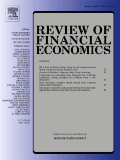
Review of Financial Economics
Illuminating the Intersection of Economics and FinanceReview of Financial Economics, published by WILEY, stands as a prominent peer-reviewed journal in the fields of economics and finance. Established in 1994, this journal provides a platform for rigorous research and thoughtful discourse, contributing to the advancement of knowledge in financial theory and its applications. With an HIndex indicative of its citation impact, it ranks in the Q3 quartile for both Economics and Econometrics, as well as Finance, based on the 2023 categorization, underscoring its role in the academic community. Although it does not currently offer Open Access, the journal remains accessible to a wide audience through institutional subscriptions. Researchers, professionals, and students are encouraged to engage with its insightful articles that address contemporary issues and advancements within financial economics, fostering a deeper understanding of the complex interplay between economic systems and financial markets.
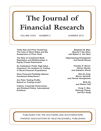
JOURNAL OF FINANCIAL RESEARCH
Navigating the Complexities of FinanceThe JOURNAL OF FINANCIAL RESEARCH, published by WILEY, stands as a pivotal platform for disseminating innovative research in the fields of finance and accounting since its inception in 1978. With an ISSN of 0270-2592 and an E-ISSN of 1475-6803, this journal aims to address contemporary challenges and trends within the financial research landscape. It has achieved notable recognition, being placed in the Q2 category for both Finance and Accounting in the 2023 rankings, signifying its relevance and impact within the academic community. Although it does not currently offer open access, the journal is accessible through various academic databases, catering to a diverse audience of researchers, professionals, and students keen on advancing their knowledge and understanding of financial systems and methodologies. With an evolving scope that encompasses empirical studies, theoretical frameworks, and practical applications, the JOURNAL OF FINANCIAL RESEARCH is committed to contributing valuable insights into the complexities of financial practices and policies.

Critical Finance Review
Transforming finance through critical analysis and innovative thought.Critical Finance Review is a premier academic journal dedicated to advancing the field of finance through the publication of high-quality research that spans various dimensions of the discipline. Published by NOW PUBLISHERS INC, this journal has quickly established itself as a leading source of innovative finance scholarship, achieving a notable Q1 classification in the 2023 finance category. Operating under a rigorous peer-review process, the journal ensures the academic integrity and relevance of its content, which attracts contributions from both emerging and established scholars. With an ISSN of 2164-5744 and E-ISSN 2164-5760, it is accessible to a global audience, though it operates under traditional access models. The journal welcomes a diverse range of topics including, but not limited to, risk management, financial markets, and quantitative finance, making it an essential resource for researchers, professionals, and students who are keen to explore the complexities of financial systems and develop new insights in the ever-evolving landscape of finance. Based in the United States, Critical Finance Review holds a significant position within the academic community, fostering a collaborative environment that encourages innovative thinking and practical applications of financial theories.
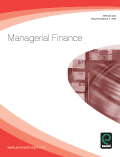
MANAGERIAL FINANCE
Advancing Knowledge in Managerial Decision-Making.MANAGERIAL FINANCE is a prestigious academic journal published by Emerald Group Publishing Ltd, focused on the areas of finance, management, and strategy. With an ISSN of 0307-4358 and an E-ISSN of 1758-7743, this journal has carved a niche for itself within the business and financial sectors, achieving a commendable Q2 category ranking across multiple domains, including Business, Management and Accounting, Finance, and Strategy and Management, as of 2023. The journal aims to provide a platform for insightful research and critical analysis while fostering an understanding of contemporary financial practices and theories. With its wide-ranging scope, it serves as a vital resource for researchers, professionals, and students alike, looking to stay abreast of the latest trends and challenges in managerial finance. The editorial board is committed to maintaining academic rigor, ensuring that articles published are of the highest quality and relevance to the field. By bridging the gap between theory and practice, MANAGERIAL FINANCE is an essential reference for anyone involved in financial decision-making and strategic management.
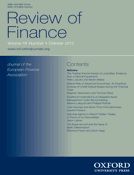
Review of Finance
Unveiling insights that shape the future of finance.The Review of Finance, published by Oxford University Press, stands as a premier academic journal in the fields of Finance, Accounting, and Economics. With an ISSN of 1572-3097 and an impressive track record stretching from 2001 to 2024, this journal is consistently recognized for its high-quality research, reflected in its Q1 rankings across key categories, including Accounting, Finance, and Economics and Econometrics. The Review of Finance is dedicated to advancing the understanding of financial phenomena through robust empirical and theoretical insights, making it an essential resource for researchers and professionals alike. Additionally, its strong Scopus rankings, placing it in the top percentiles, highlight its influence and relevance in ongoing academic discourse. Although the journal is not open access, it remains widely accessible through academic institutions, ensuring that its valuable contributions reach an extensive audience. The editorial board invites submissions that promise to further engage the academic community in the dynamic intersections of finance, accounting, and economic research.
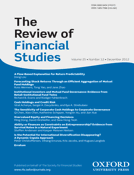
REVIEW OF FINANCIAL STUDIES
Driving Impactful Discoveries in Financial StudiesREVIEW OF FINANCIAL STUDIES, published by Oxford University Press Inc, stands as a premier academic journal in the realms of accounting, economics, and finance. With an impressive Impact Factor that reflects its high citation rates and broad influence, this journal, with an ISSN of 0893-9454 and E-ISSN 1465-7368, is considered a cornerstone for researchers, academics, and professionals seeking to contribute to and stay updated on groundbreaking developments in financial studies. Since its inception in 1996, it has established a robust reputation, consistently ranking in the Q1 category across multiple disciplines, highlighting its elite status in the global academic landscape. The Scopus rankings further reinforce its importance, positioning it at the forefront of business, economics, and finance research. While the journal is not open access, it offers vital insights and comprehensive studies that foster a deeper understanding of contemporary financial issues and methodologies. Located in the United Kingdom, the REVIEW OF FINANCIAL STUDIES is an essential resource for those aiming to advance their knowledge and research in this dynamic field.
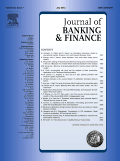
JOURNAL OF BANKING & FINANCE
Navigating the Complexities of Finance with ExpertiseWelcome to the Journal of Banking & Finance, a premier publication in the fields of finance and economics, expertly published by Elsevier. With its esteemed Q1 ranking in both the Economics and Econometrics and Finance categories for 2023, this journal frequently garners significant attention from researchers, professionals, and academics alike. Established in 1977, it has become a crucial resource for the latest research and advancements in banking and financial services, influencing policies and practices on a global scale. The journal's commitment to high-quality, peer-reviewed content ensures that it not only contributes to academic discourse but also drives real-world financial innovation. As part of the respected Elsevier publishing collection, the journal's rigorous standards and comprehensive analysis serve as indispensable tools for those seeking to understand and navigate the complexities of the financial landscape. Located in the Netherlands, the Journal of Banking & Finance continues to play a vital role in shaping the future of financial research through its impactful insights and research contributions.

Financial Innovation
Shaping Tomorrow's Financial Practices TodayFinancial Innovation, published by Springer, is a premier open access journal that has been contributing to the fields of finance and management of technology and innovation since its inception in 2015. With an impressive Q1 category ranking in both Finance and Management of Technology and Innovation, the journal places itself at the forefront of academic research, reflected in its Scopus rankings—#17 out of 317 in Finance (94th percentile) and #29 out of 289 in Management of Technology and Innovation (90th percentile). Centered in Germany, this journal aims to disseminate high-quality research that fosters theoretical and practical advancements within its scope, encouraging exchanges between academia and industry. The open access model enhances visibility and accessibility of published research, thus playing a critical role in shaping the future of financial practices and technology management. For researchers, professionals, and students alike, Financial Innovation remains essential for staying abreast of cutting-edge developments and trends in these dynamic fields.

International Journal of Financial Studies
Championing accessible research in the world of finance.The International Journal of Financial Studies is a premier publication dedicated to advancing the field of finance through open-access research. Published by MDPI based in Switzerland, this journal offers researchers, professionals, and students a platform to disseminate their findings in an accessible format since its establishment in 2013. With its ISSN of 2227-7072 and a commendable impact reflected in its Q2 ranking in finance, it occupies an influential position among finance-related journals, as evidenced by its 65th percentile rank in Scopus. The journal encompasses a wide array of topics in finance, making it essential reading for those seeking to stay abreast of current research trends and methodologies. As an open-access journal, all articles are freely available, significantly enhancing the visibility and reach of published studies, which is crucial for fostering collaboration and innovation within the global financial community. Published continuously until 2024, the International Journal of Financial Studies is not just a source of knowledge; it is a critical contributor to the progression of financial scholarship.